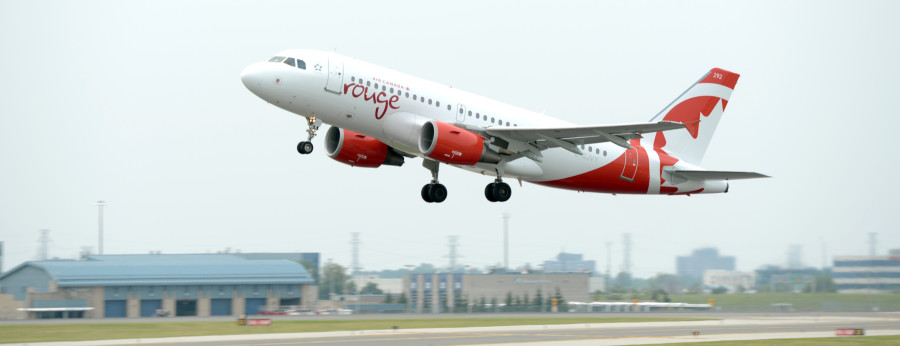MONTREAL - Checked baggage fees are paying off for Canada's two major airlines.
The charges are part of ancillary fees — which also include passenger fees for preferred seating, in-flight meals, and premium economy privileges — that airlines have tapped to boost profits.
"We'll use whatever tools we have at our disposal to drive profitability," Air Canada CEO Calin Rovinescu said this week during a conference call about its 2014 results, making reference to fee hikes, additional seating and raising airfares.
Air Canada's ancillary revenues per passenger grew 18 per cent in the fourth quarter from a year ago, largely due to the charge on the first checked bags, introduced in November, for routes in Canada, Mexico and the Caribbean. For the full year, these revenues grew 10 per cent. It did no provide specific dollar figures.
WestJet Airlines (TSX:WJA), meanwhile, recently boosted its forecasted take from the fees by 11 per cent to $100 million.
The carriers last fall introduced a $25 fee, plus tax, to check first bags on some of the lowest-class flights — affecting about 20 per cent of passengers.
WestJet had anticipated that passengers would begin using more carry-ons or limiting themselves to one suitcase. But that didn't happen.
"I think people just resigned themselves to the fact that, if the airlines are still offering a pretty decent low base fare, I'm just going to have to suck it up and I'm going to pay the first bag fee," said Robert Kokonis, president of airline consulting firm AirTrav.
Although passengers initially voiced their frustration at the bag charges, their quiet acceptance likely paves the way for airlines to add even more fees, said Kokonis. It also buttresses the decisions by the two airlines to pocket gains from the recent drop in fuel prices instead of passing on savings through lower fares.
Porter Airlines also charges a checked bag fee. The regional carrier based at Toronto's downtown island airport won't say how much it collects in the fees but spokesman Brad Cicero he no longer hears much discussion about the fee at airports.
Canadian airlines are playing catch-up with the global airline industry. WestJet's ancillary fees surged 31 per cent to $216.5 million last year. That translated into more than $11 per passenger, but still below the $16 average of global carriers. Air Canada doesn't provide such details.
Ancillary revenues are expected to reach US$49.9 billion worldwide in 2014, up 16 per cent from 2013 and more than double the US$22.6 billion collected in 2010, according to airline consultant IdeaWorks. It said these fees should account for 6.7 per cent of all revenues.
Chris Murray of AltaCorp Capital expects Air Canada will collect an extra $50 million from the new bag fees this year. He also says ancillary fees should increase by more than 20 per cent as it gets full benefit from baggage charges and extends onboard Wi-Fi services.
Original Article
Source: huffingtonpost.ca/
Author: Ross Marowits
The charges are part of ancillary fees — which also include passenger fees for preferred seating, in-flight meals, and premium economy privileges — that airlines have tapped to boost profits.
"We'll use whatever tools we have at our disposal to drive profitability," Air Canada CEO Calin Rovinescu said this week during a conference call about its 2014 results, making reference to fee hikes, additional seating and raising airfares.
Air Canada's ancillary revenues per passenger grew 18 per cent in the fourth quarter from a year ago, largely due to the charge on the first checked bags, introduced in November, for routes in Canada, Mexico and the Caribbean. For the full year, these revenues grew 10 per cent. It did no provide specific dollar figures.
WestJet Airlines (TSX:WJA), meanwhile, recently boosted its forecasted take from the fees by 11 per cent to $100 million.
The carriers last fall introduced a $25 fee, plus tax, to check first bags on some of the lowest-class flights — affecting about 20 per cent of passengers.
WestJet had anticipated that passengers would begin using more carry-ons or limiting themselves to one suitcase. But that didn't happen.
"I think people just resigned themselves to the fact that, if the airlines are still offering a pretty decent low base fare, I'm just going to have to suck it up and I'm going to pay the first bag fee," said Robert Kokonis, president of airline consulting firm AirTrav.
Although passengers initially voiced their frustration at the bag charges, their quiet acceptance likely paves the way for airlines to add even more fees, said Kokonis. It also buttresses the decisions by the two airlines to pocket gains from the recent drop in fuel prices instead of passing on savings through lower fares.
Porter Airlines also charges a checked bag fee. The regional carrier based at Toronto's downtown island airport won't say how much it collects in the fees but spokesman Brad Cicero he no longer hears much discussion about the fee at airports.
Canadian airlines are playing catch-up with the global airline industry. WestJet's ancillary fees surged 31 per cent to $216.5 million last year. That translated into more than $11 per passenger, but still below the $16 average of global carriers. Air Canada doesn't provide such details.
Ancillary revenues are expected to reach US$49.9 billion worldwide in 2014, up 16 per cent from 2013 and more than double the US$22.6 billion collected in 2010, according to airline consultant IdeaWorks. It said these fees should account for 6.7 per cent of all revenues.
Chris Murray of AltaCorp Capital expects Air Canada will collect an extra $50 million from the new bag fees this year. He also says ancillary fees should increase by more than 20 per cent as it gets full benefit from baggage charges and extends onboard Wi-Fi services.
Original Article
Source: huffingtonpost.ca/
Author: Ross Marowits

No comments:
Post a Comment